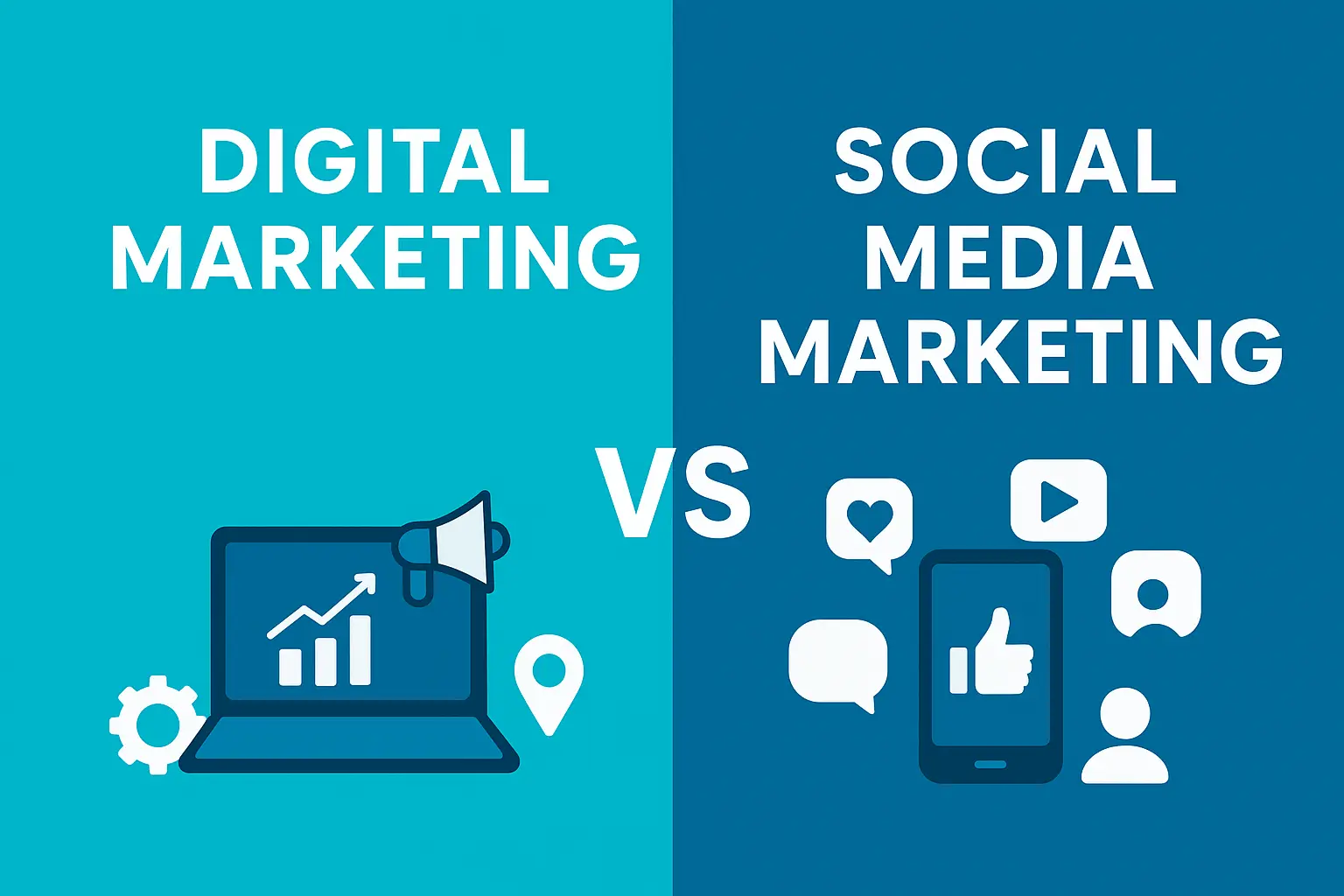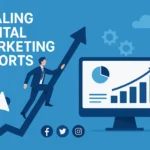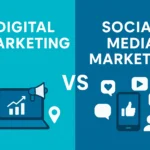Outsource Link Building in 2025: A Smart SEO Strategy with Semantic Depth

In today’s fast-paced online world, businesses often hear the terms digital marketing and social media marketing used interchangeably. However, understanding the difference between the two is crucial for creating effective strategies that drive measurable results. In this article, we will break down digital marketing vs social media marketing, explore their unique benefits, and help you determine which approach fits your business goals.
What is Digital Marketing vs Social Media Marketing?
Digital marketing is a broad term encompassing all marketing efforts that use the internet or electronic devices. It includes channels like SEO, email marketing, content marketing, PPC advertising, affiliate marketing, and social media. The main goal of digital marketing is to reach potential customers wherever they are online and guide them through the sales funnel.
On the other hand, social media marketing is a subset of digital marketing that focuses specifically on social platforms such as Facebook, Instagram, LinkedIn, TikTok, and X (formerly Twitter). It involves creating content, engaging with followers, running paid social media campaigns, and building brand awareness.
Many businesses ask, “what is digital marketing vs social media marketing?” Simply put, social media marketing is one of the tools within the digital marketing ecosystem. While digital marketing covers all online strategies, social media marketing zeroes in on social networks to influence customer behavior.
Digital Marketing vs Social Media Marketing: Key Differences
Here’s a detailed comparison to help clarify digital marketing vs social media:
| Aspect | Digital Marketing | Social Media Marketing |
|---|---|---|
| Scope | Broad (SEO, PPC, email, content, affiliates) | Focused on social networks |
| Objective | Increase overall online presence, traffic, leads, sales | Build engagement, brand awareness, and community |
| Channels | Websites, email, search engines, apps, social media | Facebook, Instagram, LinkedIn, TikTok, X, Pinterest |
| Measurement | Traffic, conversion rates, ROI, CTR, lead generation | Likes, shares, comments, engagement rate, follower growth |
| Approach | Strategic and multi-channel | Creative and audience-focused |
Social Media Marketing vs Digital Marketing: Benefits of Each
Understanding the strengths of each can help businesses make informed decisions.
Benefits of Digital Marketing
- Comprehensive reach across multiple online channels
- Highly measurable results with analytics tools
- Effective for both B2B and B2C businesses
- Supports long-term growth through SEO and email marketing
Benefits of Social Media Marketing
- Direct interaction with your audience
- Builds brand loyalty and community
- Boosts engagement and social proof
- Ideal for running targeted paid social media services campaigns
By knowing social media vs digital marketing, companies can allocate their budgets effectively to maximize ROI. For instance, if your goal is to increase brand awareness and engagement, social media marketing is ideal. If you aim to drive traffic, generate leads, and improve conversions, a broader digital marketing strategy is more effective.
Choosing the Right Approach for Your Business
While digital marketing vs social media marketing might seem like a choice, the best strategy often combines both. Businesses can integrate social media campaigns with SEO, email, and PPC strategies to create a cohesive online presence.
If you’re seeking expert guidance, partnering with a top digital marketing agency like Tekvent ensures a tailored strategy. With professional services including paid social media services, your brand can reach the right audience, improve engagement, and boost sales.
Digital vs Social Media Marketing: Final Thoughts
To sum up:
- Digital marketing is a broad, all-encompassing online marketing approach.
- Social media marketing is a specialized strategy within digital marketing, focused on social platforms.
- The most effective online strategy blends both, leveraging social media for engagement and digital marketing for broader reach and conversions.
By understanding digital vs social media marketing, businesses in the United States can make smarter decisions, maximize ROI, and stay ahead in the competitive online landscape.
For a comprehensive strategy tailored to your brand, connect with Tekvent, your trusted top digital marketing agency, offering professional paid social media services to drive measurable results.
FAQs
What is the difference between digital marketing and social media marketing?
Digital marketing encompasses all online marketing efforts, including SEO, PPC, email campaigns, and content marketing. Social media marketing is a subset of digital marketing that focuses specifically on platforms like Facebook, Instagram, and Twitter to build brand awareness and engage with audiences.
Which is more effective for business growth: digital marketing or social media marketing?
Both strategies are effective but serve different purposes. Digital marketing offers a comprehensive approach to reach a wider audience and drive conversions. Social media marketing excels in building relationships, fostering community, and enhancing brand loyalty.
Can social media marketing be part of a digital marketing strategy?
Yes, social media marketing is an integral part of digital marketing. It complements other digital channels by providing a platform for direct interaction with customers and sharing content that drives engagement.
What are the key metrics to measure success in digital marketing and social media marketing?
In digital marketing, key metrics include website traffic, conversion rates, and ROI. In social media marketing, metrics focus on engagement rates, follower growth, and social shares.
How do I choose between digital marketing and social media marketing for my business?
The choice depends on your business goals. If you aim for broad online visibility and lead generation, digital marketing is suitable. If your focus is on community engagement and brand building, social media marketing is more appropriate.


